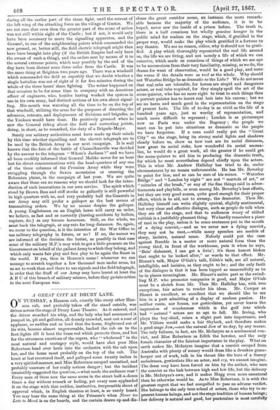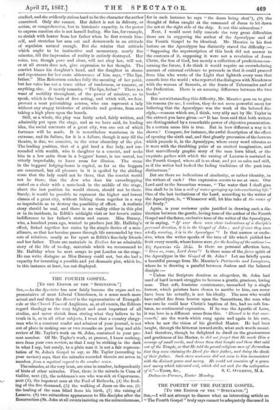A GREAT CITY AT DRURY LANE.
ON TUESDAY, a Hansom cab, exactly like every other Han- som cab, and probably taken off the stand outside, was driven across the stage of Drury Lane Theatre. As it entered, and the driver smacked his whip, and the lady who had summoned it jumped in, pit and galleries, all densely crowded, sent out a roar of applause, so sudden and so loud that the horse, frightened out of its wits, became almost ungovernable, backed the cab on to the foot-lights till it bent the brass rod which protects them, and but for the strenuous exertions of the supers, who " whohooed " in the most natural and unstagey style, would have shot poor Miss Robertson head over heels into the orchestra with the cab upon her, and the horse most probably on the top of the cab. The beast at last recovered itself, and galloped some twenty inches in a very spirited manner, and Miss Robertson escaped unscathed, and probably unaware of her really serious danger ; but the incident irresistibly suggested the quest ion,—what made the audience roar ? Every man of them sees the same scene in the street half-a-dozen times a day without remark or feeling, yet every man applauded it on the stage with that sudden, instinctive, irrepressible shout of approval which, in English theatres at least, is so rarely heard. You may hear the same thing at the Princess's when Never too Late to .Mend is on the boards, and the curtain draws up and dis-
closes the great corridor scene, an instance the more remark- able because the majority of the audience, it is to be hoped, never saw the inside of a prison before. The truth is, there is a half conscious but wholly genuine hunger in the public mind for realism on the stage, which, if gratified in the proper way, would make the play which gratified it a fortune to any theatre. We see no reason, either, why it should not be grati- fied. A play which thoroughly represented the real life around us, the life we are living, and not merely a life of which we can conceive, which made us conscious of things of which we are apt to be unconscious from their very familiarity, missing, as we do, the drama for want of observation, would be a good play, and none the worse if the details were as real as the whole. Why should not Waterloo Bridge be as dramatic as the Lido ? We do not mean that real cabs are tolerable, for horses are stupid and dangerous actors, or real tubs required, for they simply spoil the art of the scene-painter, who has no more right to trust to such things than a portrait painter has to insert real hair into his canvas ; but we see no harm and much good in the representation on the stage of present facts. The life of to-day is as vivid as the life of a hundred years ago, just as worthy of representation, and much more difficult to represent ; London is as picturesque now as Paris was under the Regency ; the people we meet can be put into situations as dramatic as the people we have forgotten. If a man could really put the "Great City" on the stage, bring its strong social lights and shadows clearly before us, show us how vast are its social distances, how great its social risks, how wonderful its social anoma- lies, he would do a great work, all the greater if he could get the scene-painter to aid him in producing the dramatic truth„ for which he must nevertheless depend chiefly upon the actors.. This is what Mr. Andrew Halliday has tried to do, under circumstances by no means unfavourable. He has Mr. Beverley to paint for him, and so can be sure of his scenes. "Waterloo Bridge" and "London by night" are not "marvels of art," or "miracles of the brush," or any of the fine things said in adver- tisements and playbills, or even among Mr. Beverley's best efforts, but they are very good scenes, quite good enough for their proper effect, which is to aid, not to swamp, the dramatist. Then Mr. Halliday himself can write slightly cynical, slightly sentimental, but very clear and effective dialogue, such as people do talk when they are off the stage, and that to audiences weary of stilted rubbish is a justifiably pleasant thing. We hardly remember a piece of rant in the play, unless it be some sentences put in the mouth of a dying convict,—and as we never saw a dying convict, they may not be rant,—while many speeches are models of sharp, incisive, natural sense. Nobody could put the case- against Bumble in a neater or more natural form than the young thief, in front of the workhouse, puts it when he says, "Bein' dishonest, I can get a livin'; it's them honest blokes that ought to be looked after," or words to that effect. Mr- Blount's talk, Major O'Gab's talk, Edith's talk, are all natural, intelligible, and incisive, as they ought to be ; and the only fault of the dialogue is that it has been lopped so unmercifully as to be in places meaningless. Mr. Blount's entire part as the swind- ling M.P. who promotes companies is good, and Major O'Galo must be a sketch from life. Then Mr. Halliday has, with two. exceptions, fair actors to render his ideas. Mr. Cowper as. Blount is excellent, so excellent that we should like to see him in a part admitting of a display of modem passion. He neither rants, nor foams, nor gesticulates, yet never leaves the impression of woodenness which is the gulf into which. bad " natural " actors are so apt to fall. Mr. Irving, who plays the boy-thief, raises a slight part into importance, and Mr. Villiers would make a fair Shylock, and therefore makes. a good stage Jew,—not the natural Jew of to-day, by any means.. The only failures, in fact, are Mr. McIntyre as a sentimental con- vict, and Miss Robertson as Edith the heroine, and the only female character of the faintest importance in the play. What on earth makes Mr. McIntyre imagine that a convict escaped from Australia with plenty of money would dress like a drunken game- keeper out of work, talk in his throat like the hero of a Surrey melodrama, gesticulate like an actor, and cry, we cannot imagine. The dress may have been forced on him by the author, who uses the convict as the link between high and low life, but the delivery is Mr. McIntyre's own, and it makes Mogg even more unnatural than he otherwise would be. As to Miss Robertson, it is with the greatest regret that we feel compelled to pass an adverse verdict. She belongs to the only true school of actors, those who try to re- present human beings, and not the stage tradition of human beings; her delivery is natural and good, her pantomime is most carefully
studied, and she evidently strives hard to be the character the author conceived. Only she cannot. Her defect is not in delivery, or action, or comprehension, but in histrionic capacity, in the power to express emotion she is not herself feeling. She has, for example, to shrink with horror from her father when he first reveals him- self, and stretches her arm out and downwards in an attitude of repulsion natural enough. But she retains that attitude which ought to be instinctive and momentary, nearly five minutes, till the impression of reality is entirely destroyed. Her voice, too, though pure and clear, will not obey her, will not, or at all events does not, give expression to her thought. The convict kisses his daughter's hand, and the daughter in shame and repentance for her caste abhorrence of him says, "The lips, father." Miss Robertson catches fully the meaning of her point, but her voice has not a trace either of tenderness, or remorse, or anything else. It merely remarks, "The lips, father." There is a want of mobility throughout, of the power of mimicry, so to speak, which is the basis of fine acting, and which will, we fear, prevent a most painstaking actress, who can represent a lady without any stagey trickeries of attitude and gesture, from ever taking a high place upon the boards.
Still, as a whole, the play was fairly acted, fairly written, and admirably put upon the stage, and as we have said, its leading idea, the social contrasts of a great city, was one out of which fortunes will be made. It is nevertheless wearisome in the extreme, and its failure, for it is a failure, though it may fill the theatre, is due, we conceive, to the utter absurdity of the plot. The leading position, that of a girl bred a fine lady, and sur- rounded with wealth, who is daughter to a convict, and seeks him in a low satin dress in a beggars' haunt, is too unreal, too utterly improbable, to leave room for illusion. The scene in the beggars' lodging-house is capital, as far as the beggars are concerned, but all pleasure in it is spoiled by the abiding sense that the lady could not be there, that the convict would not be there, that the Jew who does his eavesdropping seated on a chair with a note-book in the middle of the stage, about the last position he would choose, should not be there. Surely, it would be possible to represent the higher and lowest classes of a great city, without linking them together in a way so improbable as to destroy the possibility of effect. A realistic story should be real, and there is no reality either in this plot or in its incidents, in Edith's midnight visit or her lover's entire
indifference to her father's status and career. Miss Burney-, who, a hundred years ago, wanted to produce just Mr. Halliday's effect, linked together her castes by the simple device of a mes- alliance, so that her heroine passes through life surrounded by two sets of relatives, nearly as far apart as Edith's fine-lady friends
and her father. There are materials in Evelina for an admirable
story of the life of to-day, materials which we recommend to Mr. Halliday when he next essays to put London on the stage.
He can write dialogue as Miss Burney could not, but she had a capacity for inventing a possible and yet dramatic plot, which he, in this instance at least, has not displayed.































 Previous page
Previous page